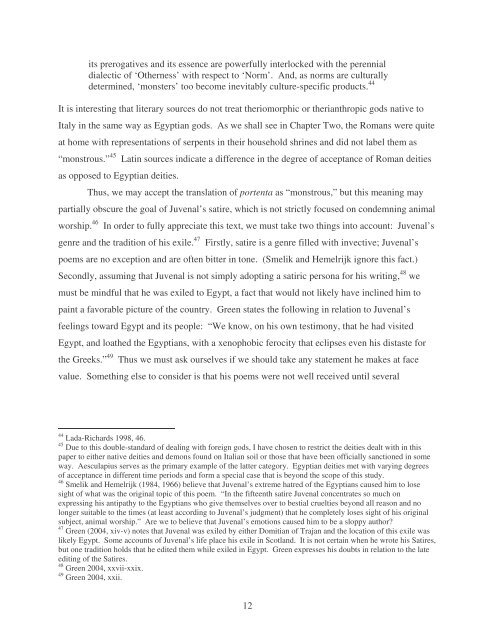Final Draft - Preview Matter - Florida State University
Final Draft - Preview Matter - Florida State University
Final Draft - Preview Matter - Florida State University
Create successful ePaper yourself
Turn your PDF publications into a flip-book with our unique Google optimized e-Paper software.
its prerogatives and its essence are powerfully interlocked with the perennial<br />
dialectic of ‘Otherness’ with respect to ‘Norm’. And, as norms are culturally<br />
determined, ‘monsters’ too become inevitably culture-specific products. 44<br />
It is interesting that literary sources do not treat theriomorphic or therianthropic gods native to<br />
Italy in the same way as Egyptian gods. As we shall see in Chapter Two, the Romans were quite<br />
at home with representations of serpents in their household shrines and did not label them as<br />
“monstrous.” 45 Latin sources indicate a difference in the degree of acceptance of Roman deities<br />
as opposed to Egyptian deities.<br />
Thus, we may accept the translation of portenta as “monstrous,” but this meaning may<br />
partially obscure the goal of Juvenal’s satire, which is not strictly focused on condemning animal<br />
worship. 46 In order to fully appreciate this text, we must take two things into account: Juvenal’s<br />
genre and the tradition of his exile. 47 Firstly, satire is a genre filled with invective; Juvenal’s<br />
poems are no exception and are often bitter in tone. (Smelik and Hemelrijk ignore this fact.)<br />
Secondly, assuming that Juvenal is not simply adopting a satiric persona for his writing, 48 we<br />
must be mindful that he was exiled to Egypt, a fact that would not likely have inclined him to<br />
paint a favorable picture of the country. Green states the following in relation to Juvenal’s<br />
feelings toward Egypt and its people: “We know, on his own testimony, that he had visited<br />
Egypt, and loathed the Egyptians, with a xenophobic ferocity that eclipses even his distaste for<br />
the Greeks.” 49 Thus we must ask ourselves if we should take any statement he makes at face<br />
value. Something else to consider is that his poems were not well received until several<br />
44 Lada-Richards 1998, 46.<br />
45 Due to this double-standard of dealing with foreign gods, I have chosen to restrict the deities dealt with in this<br />
paper to either native deities and demons found on Italian soil or those that have been officially sanctioned in some<br />
way. Aesculapius serves as the primary example of the latter category. Egyptian deities met with varying degrees<br />
of acceptance in different time periods and form a special case that is beyond the scope of this study.<br />
46 Smelik and Hemelrijk (1984, 1966) believe that Juvenal’s extreme hatred of the Egyptians caused him to lose<br />
sight of what was the original topic of this poem. “In the fifteenth satire Juvenal concentrates so much on<br />
expressing his antipathy to the Egyptians who give themselves over to bestial cruelties beyond all reason and no<br />
longer suitable to the times (at least according to Juvenal’s judgment) that he completely loses sight of his original<br />
subject, animal worship.” Are we to believe that Juvenal’s emotions caused him to be a sloppy author?<br />
47 Green (2004, xiv-v) notes that Juvenal was exiled by either Domitian of Trajan and the location of this exile was<br />
likely Egypt. Some accounts of Juvenal’s life place his exile in Scotland. It is not certain when he wrote his Satires,<br />
but one tradition holds that he edited them while exiled in Egypt. Green expresses his doubts in relation to the late<br />
editing of the Satires.<br />
48 Green 2004, xxvii-xxix.<br />
49 Green 2004, xxii.<br />
12

















